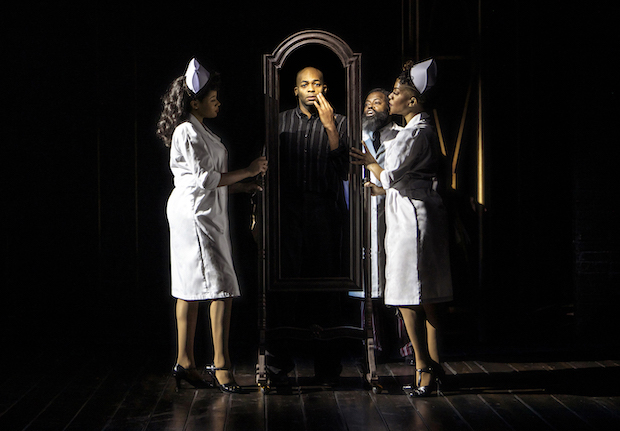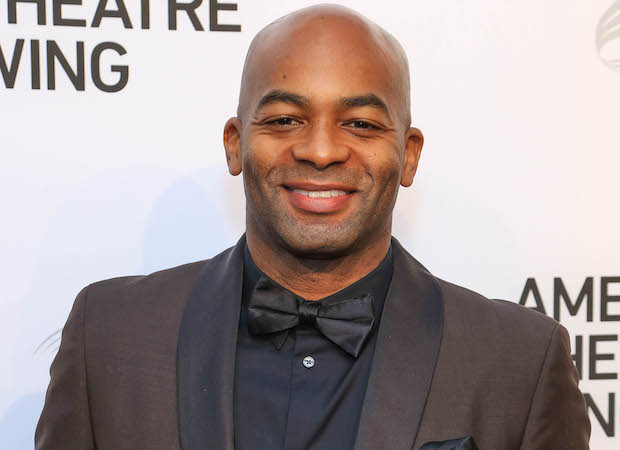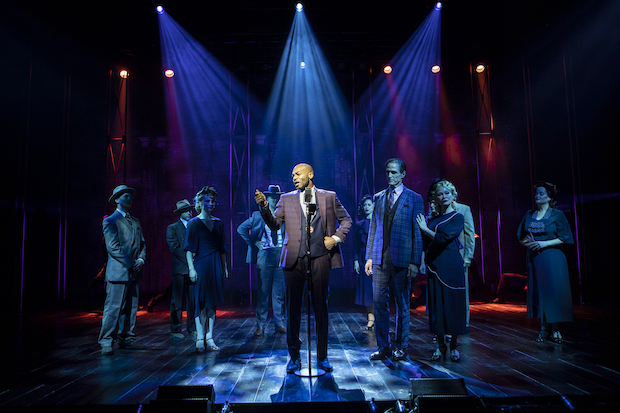Brandon Victor Dixon Talks About Black No More, the Upcoming Color Purple Movie, and Elaine Stritch
Dixon currently stars in the New Group’s ”Black No More”.

(© Monique Carboni)
One of the musical theater world's most electrifying performers, Brandon Victor Dixon has thrilled audiences in such shows as The Color Purple, Hamilton, and Shuffle Along, and in the TV version of Jesus Christ Superstar, which earned him an Emmy nomination for his memorable portrayal of Judas.
Dixon is also an outspoken activist. As many remember, after a performance of Hamilton, he read the company's scathing letter to then-vice president-elect Mike Pence, who was in the audience. Dixon is also a co-founder of the WeAre Foundation, which "uses the connective power of the arts to amplify voices that emphasize our shared humanity."
In many ways, Dixon's passions come together in the New Group's ambitious musical Black No More, an adaptation of George S. Schuyler's 1931 Afro-futurist novel with a script by Oscar winner John Ridley, directed by Scott Elliott, and featuring music by the Roots' Tariq Trotter. Dixon plays the leading role of Max, a Black man who uses a controversial invention to turn his skin white with disastrous consequences.
TheaterMania recently spoke with Dixon about the show, his philosophy on being an artist, his recent foray into songwriting, and his thoughts on the upcoming movie version of the musical The Color Purple.

(© Tricia Baron)
This interview has been edited for length and clarity.
Were you familiar with the 1931 book before you got involved with the project?
Brandon Victor Dixon: No, but when I was first asked to do the reading of this show a few years ago, I finally did read it. And I found it fascinating; it felt like it could have been written yesterday. When it comes to a work that presents such a harsh analysis of our social circumstances, especially back then, a lot of the time people like George – and their work — got pushed to the margin and forgotten.
Black No More is not your typical subject matter for a musical. Is doing the show particularly hard?
Brandon: It's absolutely not easy. Every new musical has its own unique challenges and this one is particularly difficult, especially considering the subject material and how we tread on it. When you sign on to a show, you just have to hope that you have the right creative people in the room to make good on its promise. I think we have that, especially with Tariq Trotter's incredible music and lyrics.

(© Monique Carboni)
In the second act, after Max has become the white "Matthew," you end up having to say some very ugly things about Black people, including the use of the N-word. How difficult is that for you, even if it is in character?
Brandon: They aren't difficult for me to say, because it's all part of the show's intended goal. When Max makes his big speech, he points out that this N-word is not just defining a race, but it's a social category that people use to create divisiveness among other people. Here, it's a way rich white people scare the poor white people by creating black people as a common enemy. But Max – and the show — makes it clear that at some point anyone can become the enemy, whether they're Jews, Asians, or homosexuals. Anyone can easily become the new N-word. So, no, I don't have a problem with saying it in this context.
There's a wonderful quote on your website's home page: "As an artist, I've always wanted to inspire people. Not to act or sing necessarily but to reach for something greater than themselves. Because succeed or fail, the beauty is in the endeavor." Why did you choose that sentiment?
Brandon: It's what I believe to be true, and how I first felt about acting back in college. One of the greatest examples of living that quote is Elaine Stritch doing "I'm Still Here" at the White House back in 2010. She keeps losing the lyrics, and you can see her fear, but she fights through it and finishes the song. I want people to know that it can be fear-inducing just to try to be an artist. Believe me, I've been the cat who cracked the note – many times. When I was starting out, I played the Adult Simba in the national tour of The Lion King, and it used to happen to me a lot during my first song. And then you know you still have 40 minutes left onstage, but you have to keep going.
PBS recently aired your concert from the Westport Country Playhouse, in which you sang an original song called "Maybe." Is this an area you want to keep pursuing?
Brandon: I am working on recording more music this year. My songs are something I've been developing on my own for a couple of years, but mostly in fits and starts. Lately, though, I've been more interested in seeing what I can manifest. But this will be a different area of my life than theater. I don't want to take the time to write a musical.
You were the original Harpo in the musical version of The Color Purple. Do you have any thoughts on the upcoming movie version?
Brandon: I think they have put together a wonderful cast, and these producers have proven to be great custodians of the work. The continuation of this legacy is so important! And I will always be grateful that Alice Walker brought all of us such a wonderful gift. So, yes, I am excited to see it!









